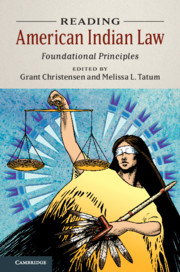Book contents
- Reading American Indian Law
- Reading American Indian Law
- Copyright page
- Dedication
- Contents
- Editors and Contributors
- Preface
- Acknowledgments
- Introduction
- Part I Core Concepts
- Part II Voices
- Part III Property
- Part IV (Mis)Understandings
- 13 Dependent Sovereigns: Indian Tribes, States, and the Federal Courts
- 14 There Is No Federal Supremacy Clause for Indian Tribes
- 15 American Indians, Crime, and the Law
- 16 Factbound and Splitless: The Certiorari Process As Barrier to Justice for Indian Tribes
- Book part
- References
13 - Dependent Sovereigns: Indian Tribes, States, and the Federal Courts
from Part IV - (Mis)Understandings
Published online by Cambridge University Press: 11 December 2019
- Reading American Indian Law
- Reading American Indian Law
- Copyright page
- Dedication
- Contents
- Editors and Contributors
- Preface
- Acknowledgments
- Introduction
- Part I Core Concepts
- Part II Voices
- Part III Property
- Part IV (Mis)Understandings
- 13 Dependent Sovereigns: Indian Tribes, States, and the Federal Courts
- 14 There Is No Federal Supremacy Clause for Indian Tribes
- 15 American Indians, Crime, and the Law
- 16 Factbound and Splitless: The Certiorari Process As Barrier to Justice for Indian Tribes
- Book part
- References
Summary
Dependent Sovereigns: examines the tension between tribal and federal sovereigns each competing to be independent from the other. Unlike states, Indian tribes have never ceded their sovereignty but appear to have lost much of it anyway, slowly eroded by the decisions of the federal judiciary. Resnik utilizes a federal courts perspective to argue that there is space in American jurisprudence to accommodate tribes as part of the interdependence of sovereigns in the American system.
- Type
- Chapter
- Information
- Reading American Indian LawFoundational Principles, pp. 311 - 333Publisher: Cambridge University PressPrint publication year: 2019



